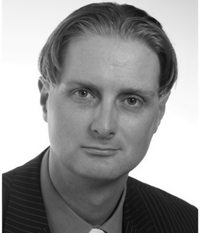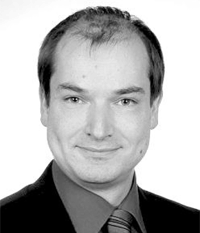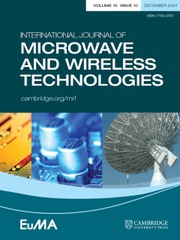This special issue of the International Journal of Microwave and Wireless Technologies is dedicated to flexible electronics for wireless communication as well as their packaging and integration. Mechanical flexibility will be a key feature in future electronics, as it will enable bendability, foldability, and stretchability of active modules. The ability to communicate with these systems wirelessly will enable many novel applications in many diverse domains, from wearable electronics to environmental and medical monitoring.
Two papers were selected for publication in this special issue. The first paper originates from research efforts driven by the German Research Foundation in the priority program FFlexCom, which combines 34 leading German institutions in the field flexible electronics. It presents a 45 µm thick flexible silicon power amplifier that can operate at 6 GHz. This amplifier is integrated in polymer films with a planar antenna. The whole package is less than 100 µm thick and can be bent down to 4 mm radius. The second paper has its background at the Arab Academy for Science in Egypt. It presents a planar wideband antenna and discusses its change in characteristics while being bent.
 Frank Ellinger (S'97–M'01–SM'06) was born in Friedrichshafen, Germany, in 1972. He received the Diploma degree in electrical engineering from the University of Ulm, Ulm, Germany, in 1996, and the MBA and Ph.D. degrees in electrical engineering and Habilitation degree in high-frequency circuit design from ETH Zürich (ETHZ), Zürich, Switzerland, in 2001 and 2004, respectively.
Frank Ellinger (S'97–M'01–SM'06) was born in Friedrichshafen, Germany, in 1972. He received the Diploma degree in electrical engineering from the University of Ulm, Ulm, Germany, in 1996, and the MBA and Ph.D. degrees in electrical engineering and Habilitation degree in high-frequency circuit design from ETH Zürich (ETHZ), Zürich, Switzerland, in 2001 and 2004, respectively.
From 2001 to 2006, he was the Head of the RFIC Design Group, Electronics Laboratory, ETHZ, and a Project Leader with the IBM/ETHZ Competence Center for Advanced Silicon Electronics, IBM Research, Rüschlikon, Switzerland. He has been the Coordinator of the RESOLUTION, MIMAX, ADDAPT, and FLEXIBILITY projects funded by the European Union. He coordinates the cluster project FAST with more than 90 partners (most of them from industry) and the Priority Program FFlexCom of the German Research Foundation. Since 2006, he has been a Full Professor and the Head of the Chair for Circuit Design and Network Theory, Technische Universität Dresden, Dresden, Germany. He has authored or co-authored over 450 refereed scientific papers. He authored Radio Frequency Integrated Circuits and Technologies (Springer, 2008).
Prof. Ellinger has been a member of the Management Board of the German Excellence Cluster Cool Silicon. He was an elected IEEE Microwave Theory and Techniques Society (MTT-S) Distinguished Microwave Lecturer (2009–2011). He was a recipient of several awards including the Vodafone Innovation Award, the Alcatel-Lucent Science Award, the IEEE Outstanding Young Engineer Award, the ETH Medal, the Denzler Award, the Rohde&Schwarz/Agilent/Gerotron EEEf-COM Innovation Award (twice), and the ETHZ Young Ph.D. Award.
 Tilo Meister (S'07–M'13) received the Diploma degree in electrical engineering and the Ph.D. (Dr.-Ing.) degree from the Technische Universität Dresden, Dresden, Germany, in 2006 and 2012, respectively. He is a Senior Researcher and the FFlexCom Program Manager with the Chair for Circuit Design and Network Theory, Technische Universität Dresden. He is also a member of the TPC of the International Solid-State Circuits Conference. His current research interests include modeling and circuit design for flexible electronics, Beyond Moore's technologies, and millimeter-wave IC design in silicon-based technologies.
Tilo Meister (S'07–M'13) received the Diploma degree in electrical engineering and the Ph.D. (Dr.-Ing.) degree from the Technische Universität Dresden, Dresden, Germany, in 2006 and 2012, respectively. He is a Senior Researcher and the FFlexCom Program Manager with the Chair for Circuit Design and Network Theory, Technische Universität Dresden. He is also a member of the TPC of the International Solid-State Circuits Conference. His current research interests include modeling and circuit design for flexible electronics, Beyond Moore's technologies, and millimeter-wave IC design in silicon-based technologies.


